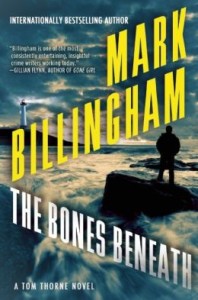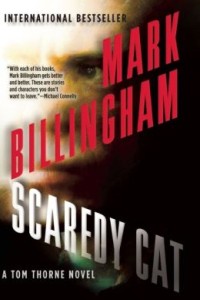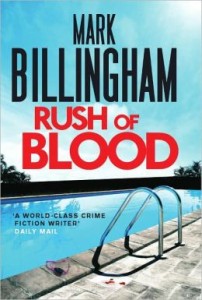From The Booking Desk:
Today, I am happy to present the third post in our ongoing series covering the various elements of writing. (Be sure to read the first part of the series, with David Freed discussing Setting and the second part of the series where Linda Rodriguez discusses character).
It is a real pleasure for me to welcome Mark Billingham to BOLO Books. As one of the funniest men in crime fiction writing, Mark’s guest post on dialogue really shines with his wit and candor. If you have ever read one of his books, you will no doubt agree that he is one of the masters of dialogue in fiction. With that in mind, let’s turn things over to Mark:
“So, you think dialogue’s the most important thing in a book?”
“You bet your arse I do.”
“Arse?”
“Yep. Arse, not ass. And I spell dialogue with a U and an E.”
“Who’s got time for all those extra letters?”
“We don’t get out much in the UK. Have you seen our weather…?”
Most writers – at least those of us who are trying to appear deep and interesting and don’t want to admit that we sit around all day in our pyjamas making stuff up – when asked about a writing process, will say that it begins and ends with character. As a crime writer, you can have all the plot twists and clever reveals and a whole bag full of genre pyrotechnics to pull them out of, but unless you have characters who live and breathe on the page, you’ve got bugger all. If you want suspense, then you give your reader characters with whom they can engage; no big mystery.
The best way to do that? Dialogue. With or without a U and an E…
 There is a lot of dialogue in my Tom Thorne novels and that is probably because it is the element of a book that I feel most comfortable with. I’ve always believed that a writer needs to know what their strengths and weaknesses are, and mine have become increasingly obvious to me over the years. I find that I can write dialogue quickly, while I can struggle for days to find the right words to describe a particular sort of sky or what a character might be wearing. This is almost certainly due to the time I spent inching up the notoriously greasy pole of TV writing. As a television writer, you can work hard to write detailed and luxuriant stage directions, you can try to create atmosphere and go into enormous detail as to what your settings and characters are like. Once a director and designer get hold of your script however and begin doing their jobs, most of that goes out of the window and all the writer is left with is their dialogue. If you’re saddled with a particular sort of actor, you’re lucky if you’re even left with that. So, I spent many years putting all my effort into dialogue; using the words spoken by my characters to move the narrative along. This is now the way I try to make the books work, too.
There is a lot of dialogue in my Tom Thorne novels and that is probably because it is the element of a book that I feel most comfortable with. I’ve always believed that a writer needs to know what their strengths and weaknesses are, and mine have become increasingly obvious to me over the years. I find that I can write dialogue quickly, while I can struggle for days to find the right words to describe a particular sort of sky or what a character might be wearing. This is almost certainly due to the time I spent inching up the notoriously greasy pole of TV writing. As a television writer, you can work hard to write detailed and luxuriant stage directions, you can try to create atmosphere and go into enormous detail as to what your settings and characters are like. Once a director and designer get hold of your script however and begin doing their jobs, most of that goes out of the window and all the writer is left with is their dialogue. If you’re saddled with a particular sort of actor, you’re lucky if you’re even left with that. So, I spent many years putting all my effort into dialogue; using the words spoken by my characters to move the narrative along. This is now the way I try to make the books work, too.
 As a reader, my preference is no different. I can be reading something by a writer whose lush and sensuous descriptions of a landscape are positively breath-taking, but if that writer has a tin ear for dialogue, I’m just not interested. For me, the finest writers have always been those who do everything with dialogue. I’m talking about the greats like Elmore Leonard or George V Higgins of course, and those working today whose facility with dialogue is enviable. The likes of George Pelecanos, Laura Lippman and John Harvey. What these writers do is simply put their characters on the page and let them speak. Everything the reader needs to know is there in what the characters say, meaning there is no need for convoluted backstory or clumsy exposition. In the hands of great writers, this is storytelling at its simplest and best and it amazes me that any writer would try and do it any other way.
As a reader, my preference is no different. I can be reading something by a writer whose lush and sensuous descriptions of a landscape are positively breath-taking, but if that writer has a tin ear for dialogue, I’m just not interested. For me, the finest writers have always been those who do everything with dialogue. I’m talking about the greats like Elmore Leonard or George V Higgins of course, and those working today whose facility with dialogue is enviable. The likes of George Pelecanos, Laura Lippman and John Harvey. What these writers do is simply put their characters on the page and let them speak. Everything the reader needs to know is there in what the characters say, meaning there is no need for convoluted backstory or clumsy exposition. In the hands of great writers, this is storytelling at its simplest and best and it amazes me that any writer would try and do it any other way.
We can’t all be Elmore Leonard, of course, but I firmly believe that every writer can get better at writing decent dialogue. Listen to what people say, and, when it’s done, read your dialogue out loud. A line of dialogue that is bogus should be as obvious as a bum note in a symphony.
 As a crime writer, I am a storyteller first and last and I firmly believe that your characters should be the ones to tell it. It’s their story, after all. When the omniscient narrator steps in and starts to do the telling, it is what Leonard described as “doing the reader’s job for them.”
As a crime writer, I am a storyteller first and last and I firmly believe that your characters should be the ones to tell it. It’s their story, after all. When the omniscient narrator steps in and starts to do the telling, it is what Leonard described as “doing the reader’s job for them.”
Yes, a day when I come up with an interesting hook or a great plot twist is a good day. I’m grateful for any day when I come up with something worth writing down. But unless the words coming out of Thorne’s mouth, of the mouths of every other character, are genuine and true; unless I can make the words spoken by ordinary people sing a little, I’m not doing my job properly.
“Can we get back to this extra letters thing?”
“They aren’t extra letters. You just got rid of them for some reason. I don’t know, maybe you’re just lazy.”
“Are you looking to get your ass kicked?”
“I told you already. It’s arse…”
From the Booking Desk:
How great was that? Thanks so much to Mark Billingham for stopping by BOLO Books to add to our conversation about the various elements of writing. Be sure to check out his latest book, The Bones Beneath. And be sure to check back for the BOLO Books review of the title coming up on Friday. I can tell you now that you will want to read this book.
